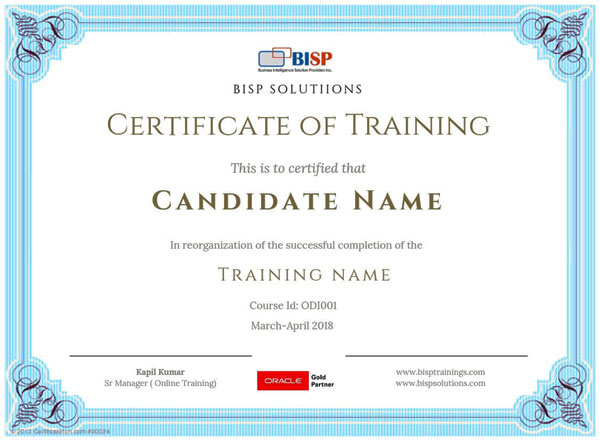Oracle Hyperion Financial Data Quality Management EE Administration (FDMEE)
Product Orientation
- FDMEE Overview
- Key Benefits and Features of FDMEE
- FDMEE Integration Process
- Processing Data Overview
- Accessing and Navigating in FDMEE
Preparing FDMEE Integrations
- Integration Setup Overview
- Setting Up the Application Root Folder
- Defining Profiles
- Setting Up Source Systems
- Registering Target Applications
Setting Up Import Formats for File Systems
- Import Formats Overview
- Creating Import Formats
- Defining Import Format Mappings
- Skipping Lines in Import Files
- Concatenating Fields
- Adding Import Expressions
Completing the Integration Setup
- Locations Overview
- Adding Locations
- Setting Location Details and Integration Options
- Periods and Categories Overview
- Defining Period Mappings
- Defining Category Mappings
- Point of View Overview
Setting Up Data Load Mappings
- Data Load Mappings Overview
- Defining Data Load Mappings
- Explicit Mappings
- Mapping Rules
- Processing Order
- Building Maps Externally
- Importing Mappings
- Sharing Mappings
Defining and Executing Data Load Rules
- Data Load Rules Overview
- Defining Data Load Rules for File-Based Data Loads
- Loading Data into Multiple Periods
- Running Data Rules and Checking Rule Status
- Viewing Imported Data
- Scheduling Data Load Rules
Processing Data in Data Load Workbench
- Processing Data Overview
- Importing Source Data
- Validating Dimension Mappings
- Fixing Validation Errors
- Intersection Check Reports
- Managing Data
- Loading Data to Target Applications
- Drilling Through from Target Applications
Setting Up Check Rules and Check Entities
- Check Rules and Reports Overview
- Creating Check Rule Groups and Check Rules
- Assigning Check Rules to Locations
- Verifying Check Rules
- Check Entities Overview
- Creating Check Entity Groups
- Verifying Consolidations
Processing Batches
- Batch Processing Overview
- Adding Batch Definitions
- Defining Batch Parameters
- Executing Batches
- Creating and Executing Open Batches
- Scheduling Batches
- Executing Batch Scripts
Reporting in FDMEE
- FDMEE Reports Overview
- Adding Report Groups
- Running Reports
- Reviewing and Adding Query Definitions
- Generating XML Files
- Creating Report Templates
- Adding Report Definitions
Setting Up Security
- FDMEE Security Overview
- Setting Up FDMEE Security
- Defining Role, Report, and Batch Security
- Location Security
- Adding Groups for Location Security
- Assigning Users to Groups in Shared Services
- Provisioning Users in Shared Services
Defining Import Scripts
- Scripting in FDMEE Overview
- Jython Basics
- Accessing Script Editor
- Creating Import Scripts
- Assigning Import Scripts to Import Formats
- Applying Import Script Functions
- Using Temporary Variables in Import Scripts
Defining Mapping and Event Scripts
- Mapping Scripts Overview
- Jython Objects in Mapping Scripts
- Setting Up Mapping Scripts
- Event Scripts Overview
- Creating Event Scripts
- Changing Import Formats Dynamically
- Using the File System Object in Event Scripts
FDMEE Integration with Other Source Systems
- GL Integration Overview
- Registering ERP Source Systems
- Selecting Source Accounting Entities
- Creating Import Formats for Accounting Entities
- Setting Up the Integration for Source Systems
- Drilling Through to Source Data
- Importing Source Data from the Open Interface Table

